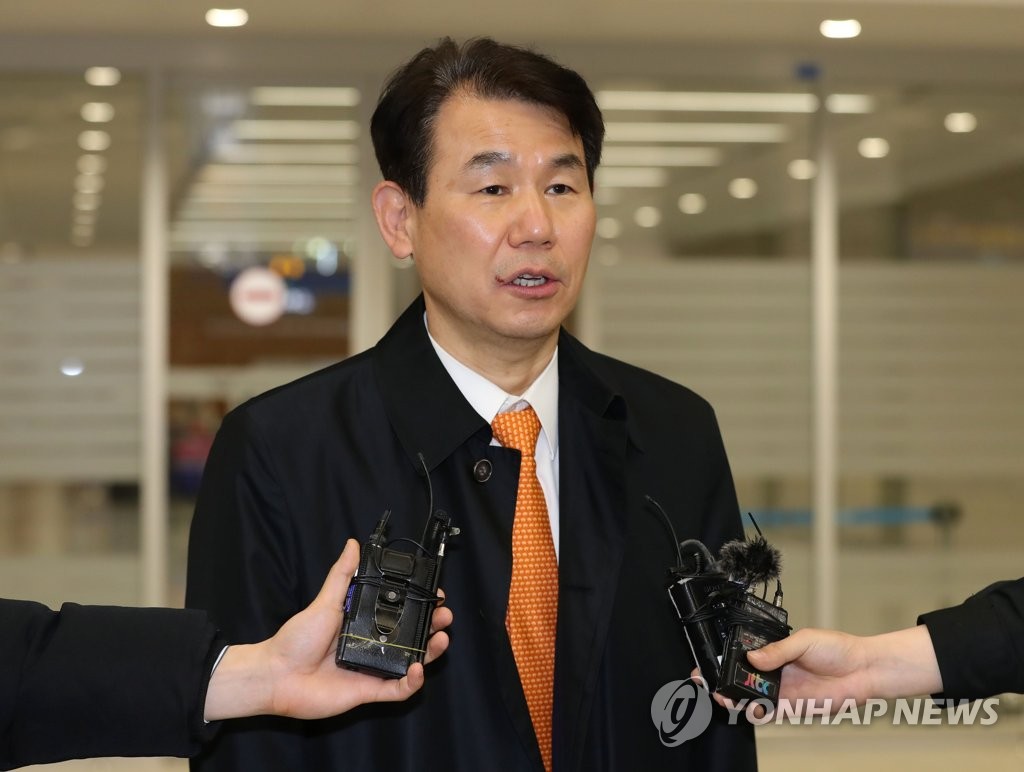- California Assembly OKs highest minimum wage in nation
- S. Korea unveils first graphic cigarette warnings
- US joins with South Korea, Japan in bid to deter North Korea
- LPGA golfer Chun In-gee finally back in action
- S. Korea won’t be top seed in final World Cup qualification round
- US men’s soccer misses 2nd straight Olympics
- US back on track in qualifying with 4-0 win over Guatemala
- High-intensity workout injuries spawn cottage industry
- CDC expands range of Zika mosquitoes into parts of Northeast
- Who knew? ‘The Walking Dead’ is helping families connect
S. Korean negotiator expresses regret over planned furloughs of Korean USFK employees
South Korea’s top negotiator in defense cost-sharing talks with the United States expressed regrets Tuesday over the planned furloughs of thousands of Koreans employed by U.S. Forces Korea, calling on Washington to make efforts to enable their swift return to work.
Jeong Eun-bo also voiced expectation for the conclusion of the negotiations in the near future, stressing Seoul and Washington have “considerably” narrowed their differences over the sharing of the cost for stationing 28,500 American troops here.
The message came a day before about 4,500-5,000 workers, mostly in nonessential positions, are expected to go on unpaid leave due to a failure to reach agreement on the cost-sharing deal, called Special Measures Agreement (SMA).
“The decision by the U.S. side to press ahead with the furloughs for our workers as planned does not properly reflect the situation of the negotiations and we think this is regrettable,” Jeong said.
“We urge the U.S. to take measures to ensure the workers subject to the furlough scheme can swiftly return to work,” he added.
Jeong was referring to Seoul’s efforts in the previous negotiations to reach a separate arrangement to first address the workers’ wage issue. The U.S. rejected the efforts, saying they would hinder the overall negotiations for a comprehensive SMA.
On the outlook for the negotiations going forward, Jeong struck a positive note.
“Currently, South Korea and the U.S. are making their best efforts to conclude the negotiations, now at their last phase, in a mutually beneficial way,” he said.
“Given that the countries have considerably narrowed differences, we expect the final conclusion of the negotiations in the near future,” he added.
The planned furloughs have triggered concerns that they could disrupt day-to-day USFK operations and undercut the military’s readiness against the backdrop of military tensions caused by Pyongyang’s repeated rocket tests.
Since September last year, the two sides have held seven rounds of talks to negotiate the SMA. But they have failed to bridge gaps, particularly about the total amount of Seoul’s payments for stationing the USFK.
The U.S. has revised downward its initial demand of a fivefold increase to US$5 billion. But Seoul believes the reduced amount is still unrealistically high, while it reportedly wants about a 10 percent increase from the previous year.
Last year’s SMA, which called for Seoul to pay about $870 million, expired in December.
The delay in the conclusion of the negotiations has spawned criticism here that the U.S. is focusing more on the pecuniary interests of the alliance than on more strategic security interests for regional stability.

This photo, taken on March 21, 2020, shows Jeong Eun-bo, South Korea’s top negotiator in the defense cost-sharing talks with the United States, speaking to the press upon arriving at Incheon International Airport, west of Seoul. (Yonhap)











